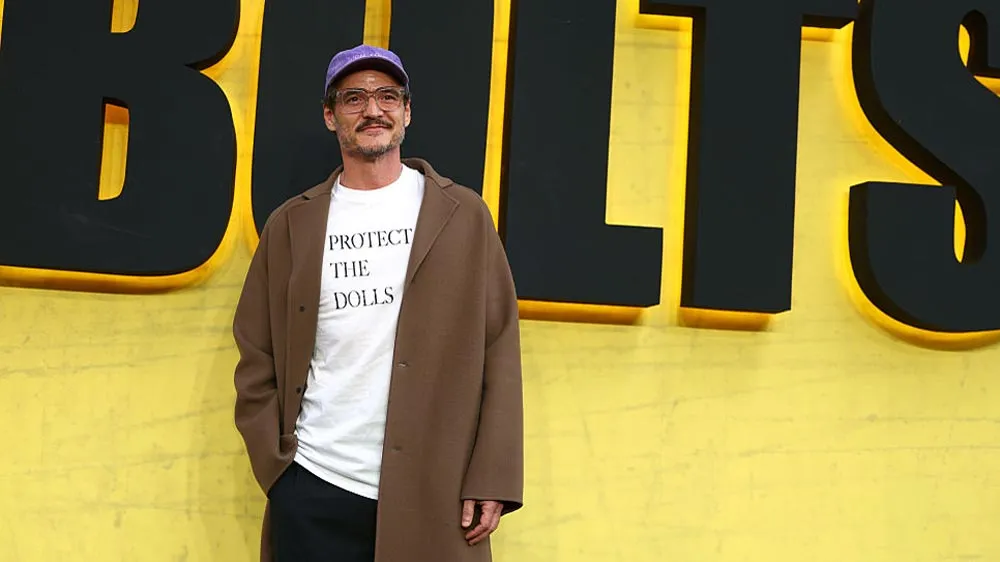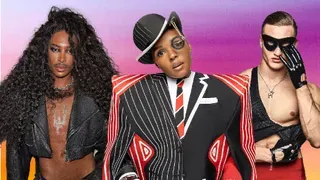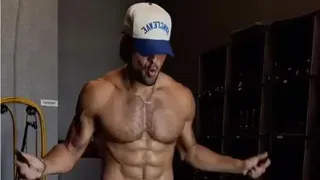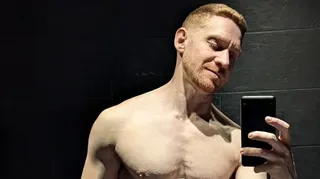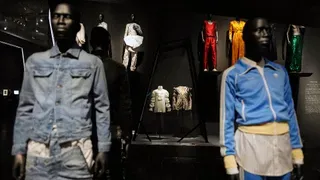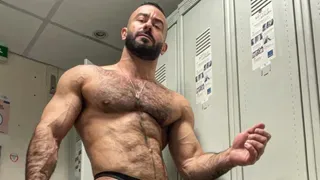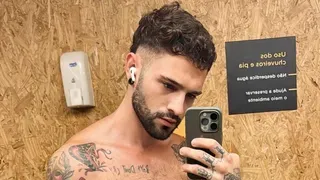March 10, 2023
EDGE Interview: Luke Gilford Takes Queer Rodeo to the Big Screen at SXSW
Matthew Creith READ TIME: 9 MIN.
As a child growing up in Colorado, out director and photographer Luke Gilford's father was a member of the Professional Rodeo Cowboys Association, which meant that Gilford was constantly surrounded by the rodeo. While the rodeo was often associated with conservatism and homophobia, Gilford's perspective changed when he discovered the International Gay Rodeo Association (IGRA). The IGRA is a community for LGBTQ+ cowboys and cowgirls that provides a safe space for individuals of all races and gender expressions.
Through personal experiences, Gilford learned first-hand that the queer rodeo allows participants from rural areas all over America to hone their riding skills and support one another. In 2020, America's Queer Rodeo," a photography book that documents this dynamic subsection of the queer community.
Now, that book has been reimagined for the big screen in a movie simply called "National Anthem." At the heart of the movie is Dylan, a 21-year-old resident of New Mexico who works various construction jobs to provide for his alcoholic mother and younger brother. When Dylan accepts a new job at a homestead run by a community of queer rodeo performers and ranchers, he finds himself captivated by the wild and untamed landscape of America that surrounds him. As he explores this new environment, Dylan discovers more about himself and becomes infatuated with Sky, a talented barrel racer who exudes free-spirited energy. Together, they navigate the challenges posed by nature, family, and love while working amidst the stunning expanse of the Southwest.
After a career making short films and music videos featuring Christina Aguilera, Kesha, and Troye Sivan, Luke Gilford embarks on his feature film directorial debut.
Directed by Luke Gilford, "National Anthem" will have its World Premiere at the Stateside Theatre in Austin, Texas, on the opening night of South by Southwest March 10. The movie stars Charlie Plummer as Dylan, Eve Lindley as Sky, Rene Rosado as Pepe, Mason Alexander Park as Carrie, and Robyn Lively as Fiona.
EDGE caught up with Luke Gilford for a fun and meaningful chat about the movie's depiction of a subsection of the queer community, the transition from photography to film, and what it's like to have such a personal story premiering at a world-renowned film festival.
EDGE: Hi Luke, it's nice to meet you.
Luke Gilford: It's nice to meet you too.
EDGE: I had a chance to see "National Anthem" and I just wanted to let you know it's such a raw, gorgeous film. The characters are just so beautiful inside and out. It's such a different type of perspective of the queer community. I think it really illustrates how personal a movie this probably was for you.
What was it like, this journey going from that experience of seeing it first hand, doing the photography book, and translating that to the screen?
Luke Gilford: It was a very organic process. For me, so much of the process of making the book was around stories. Everytime I would take a portrait with someone it was a way of connecting and then like creating this, this bridge to one another through the process of storytelling and discovering these very universal stories around a connection to nature, to family, chosen family, and heartbreak and loss.
It was for me a really personal journey because my father was in the Professional Rodeo Cowboys Association. So, it was a way to reconnect to Western culture which I love so much but was sort of excluded from as I discovered how homophobic and patriarchal and racist and just toxic the mainstream rodeo can be so to discover this subculture was like a beacon of hope. A big part of that process was just connecting through storytelling and I think one of the great lessons I learned from photography was how to express so much deep emotion in a single frame. I think faces really do tell stories.
So it was a very organic process of discovering this world that's really Dylan's stories. This unlocked so much possibility for him. His entire future like the transformative process of love, in a way to open up these multitudes within us that we may not have yet known were there.
EDGE: You mentioned family and in the movie you made kind of a big point to show Dylan's family. Not only his younger brother, but an alcoholic mother that really was pretty distanced from her kids. Even though it seemed like she wanted them close by she really just didn't know them very well. But, over time she really embraces Dylan and the new chosen family that he's acquired. Was that a specific choice that you wanted to make when you were co-writing and when you were directing?
Luke Gilford: That's so much of my own experience. You did touch on something too, about a lot of these stories, there's so many cliches around coming of age and queer films. The process of writing was so much about peeling back the cliches and trying to reveal other possibilities and other truths.
I think that when we come into contact with a queer person or a queer person is a family member, it helps humanize them for us and that proximity to queerness can open us up to those possibilities of not being put into a box. I think none of us really fit into any of those boxes. They cannot contain who we really are. To me, queerness is possibility and it's the future. It's hope, it's transformation, it's transcendent. Fiona represents this old way of thinking, but through love, she is opened up to other possibilities. I think she is left with hope by the end of the film.
EDGE: I grew up in Los Angeles and I chose to move to Texas on my own and didn't know anyone, ended up meeting my husband here. Everyone that I know that still lives in California, they think I'm just so crazy for living in a red state. They don't have any experience with rodeos or cowboys. What would you say to people that don't have a perspective within this world?
Luke Gilford: That's very inspiring. I hope I find my husband in Texas. I use the term queer to kind of include the whole LGBTQIA spectrum. Queer people have been seeking and finding each other and existing and surviving since the dawn of time. And so you know, of course they exist in Texas. Seeking and finding each other, creating these safe spaces together, even in what might be seen as an unlikely place.
These safe spaces are a beacon of hope and of light. Yes, queer and trans people are very much in danger. There's over 70 Anti-LGBTQ bills proposed in Texas in this legislative season. So this year is a very scary time for queer people. But we're very familiar with that. I wanted to represent the real, very real existence of these safe spaces and the beauty and importance of them for queer people, anywhere. That empathy and humanity and acceptance does exist, even in unlikely places.
EDGE: So what has been the reaction to your book and the making of this movie from those that are depicted in the film? Have you heard from anyone yet? Are you bringing anyone to South by Southwest that are actual rodeo performers?
Luke Gilford: Well, that's my chosen family. So a lot of them are coming. It's a super exciting moment. The book and the exhibition have been in galleries and museums. So that was a huge thing when I came to New York and there were big billboards and stuff. In New York, you know, for small town, Texas folks and rural Southwest folks, that was super exciting.
It's been kind of an invisible community. When you say queer rodeo, most people are like, wait, what? Why? I think it's a story that needs to be told. Like this is really a Western and it's a love story for the new world. I think it's so important that we take this archetype of the classic American cowboy, and reinvent it for these modern times where we're told that expressing our emotions is dangerous. I've really wanted to show a cowboy who's brave enough to love and to be vulnerable and can try bull riding as well as try drag in the same film, which I don't think we've seen that before.
EDGE: I sure haven't.
Luke Gilford: Yeah, exactly. That's actually beautiful and a normal part of uncovering ourselves and the many layers that we all contain. I hope that this helps us reframe some of these kind of old, tired, traditional stereotypes and see that there's so much more nuance.
EDGE: I know that you've been a short film director, I know you've been a music video director and you've been very involved in visual arts for a long time. How do you feel about finishing your first feature film?
Luke Gilford: Oh my gosh, it's surreal. A dream come true. I mean, I didn't go to film school. I don't have any connection to the industry. So it was a very organic process of just falling in love with film and wanting to tell stories and just kind of finding my voice. Starting with photography, then people asking me to make music videos not knowing how but just try. Then the book happened and it really felt like there's so much more to be shared within this world. This insane magnetism and urge to share this story.
It's such a gift to be able to do this. I'm not taking it for granted. At all. It's such a dream and I'm just so over the moon excited to share this. I think whether people like it or not, just the fact that it was made, is just a dream to me.
EDGE: It's really amazing to hear all the positives. How about any negatives: were there any challenges when you were filming? Were the animals cooperating? Was weather ever a factor?
Luke Gilford: I mean, the filmmaking process requires just constant tenacity and perseverance. Of course, they're all of the above. No one told us when we were shooting in New Mexico that it was the windy season that we were there. So there's some scenes that are very windy. Our boom operator blew away like Mary Poppins when there were dust storms and all kinds of crazy things happened.
We made the whole film in a very short period of time like 17 days. We shot on film, so that required a ton of planning and precision as well. It's always a trying process, but it's also so euphoric and exciting. I think I really do thrive in those situations with so many years of onset experience from photoshoots and celebrities and all kinds of crazy things happening over the years. I've learned a lot and I really felt comfortable and confident even when it was hard. So to me, this is the scariest moment, of just sharing it with the world.
"National Anthem" will premiere at SXSW on March 10 with additional screenings on March 13 and 15. For tickets and more information, follow this link.
